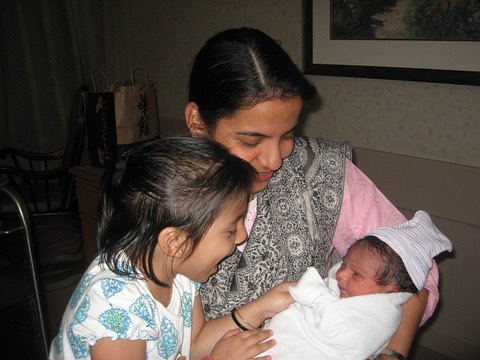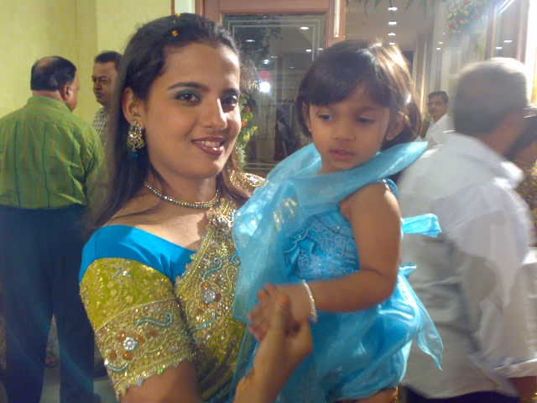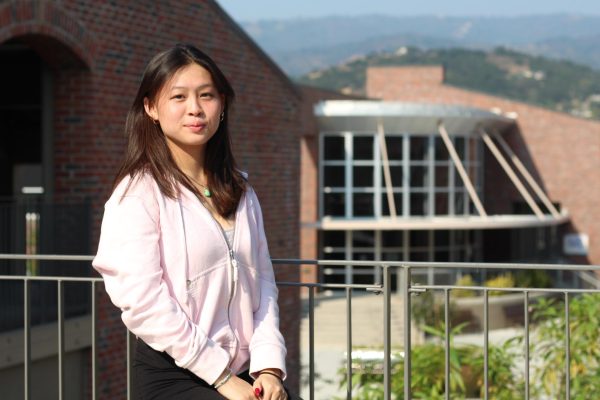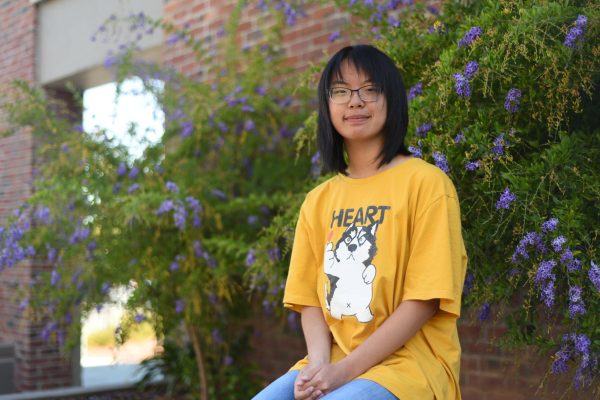*Abdulah Shaikh and Khairunnisa Shaikh’s audio is translated by their daughter, Afroza Khan
Senior Afsheen Khan’s grandparents grew up in Maharashtra, a rural state in the western region of India. Though they grew up in different villages, they recount similar experiences of plentiful natural resources and a society connected through meaningful socialization. Later, the two moved to Mumbai and began their family.
“We follow Islam and we’re Muslim so a lot of the cultural values and ideas reflect that,” Afsheen said. “And another part of that also goes into our family history during the times of partition, when India and Pakistan became separated. Both of my parents’ families also had to deal with that kind of the violence that came with it, but also just having to think about whether they should move from their villages to Pakistan or to continue staying where they resided and they chose to stay in India.”
Afsheen’s grandmother, Khairunnisa Shaikh, fondly recalls growing up in Maharashtra and being able to grow her own food. But her true passion lay in going to school, and as one of the top students in her class, she aspired to become a teacher and help educate other students in her village.
“She wanted to become a teacher, but because of the restrictions coming from the culture at that time, they would not want any girl to go away from the house to study and get educated,” Khairunnisa said. “Her dad said no, ‘we don’t let girls go out so far and we want to get her married.’ So that’s something that she could not do. She knows there were good intentions, but she still misses that phase of her life.”
Similarly, Afsheen’s grandfather, Abdulah Shaikh, had different dreams compared to what his parents wished for him. Growing up as the second eldest sibling amongst six children, Abdulah’s father encouraged him to find a nine-to-five job that would guarantee a steady income. Despite this, Abdulah wanted to start his own business in order to support his family.
“He actually went against his dad’s wishes, very respectfully, but he said ‘No, I want to be my own boss,’” Abdulah said. “Even if it’s a small business, I will do that. So he was just a high school graduate, he didn’t go further in his studies because he wanted to earn money and take care of his family. Then he got married to my mom and then he had four daughters.”
But having a family with four daughters came with a unique set of challenges for Abdulah and Khairunnisa. Societal expectations of the time dictated that daughters would become homemakers and thus did not need much of an education. However, Abdulah and Khairunnisa had something else in mind for their children.
“The basic mentality in Indian culture — now it’s changing and it has changed a lot — but at that time, they would say, ‘Oh, you don’t have [a] son? Now, no one is going to take care of you. [With] four daughters, you should not be putting all your efforts and your money for their education because they are gonna get married and they’re gonna go to other people’s houses and they’ll take care of their families,’” Abdulah said. “But my mom and dad were adamant about [saying] ‘No, we have to give the education the same as if we would have had sons.’ They had to face a lot of opposition, but my mom and dad ignored those things, they paid attention and focused on our future more than anyone else.”
Abdulah recommends that everyone should continue to educate their children, regardless of their gender. He emphasizes the importance of supporting girls’ education, even when society condemns it. His four daughters eventually grew up, with two of his daughters becoming doctors, while one obtained a master’s in computers and the other obtained a MBA in business administration.

“I’m so proud of my daughters because now they are taking care of me and they are paying attention to our needs,” Abdulah said. “I have no regrets, having four daughters and doing everything for them. And my wife supported me a lot. Maybe right now, in this particular moment, it is not a big thing, but 40 years ago, it was a huge change that happened in society.”
But societal norms are far from the most that the family has gone through. During the 1990s, a time of political unrest, riots and growing Hindu-Muslim divisions, they lived in Bombay (currently known as Mumbai), a major city and a hotspot for violence.
“I think the most interesting part of our family history was the times during the partition and also the riots that happened after it because my grandparents lived through it and my parents also had some experiences with it,” Afsheen said. “I know a few stories where my mom, she lived in a building where there were three floors in the building [and my family] was locked in their building for about a month and they couldn’t come out because the riots in Mumbai were getting really violent and it was unsafe to do so.”
Tensions that had been building for months came to a head on March 12, 1993. Afroza, Afsheen’s mother — then only a 15-year-old student — recounts her experience with the 1993 Bombay bombings. Afroza explains that luck allowed her to be saved, after she narrowly avoided the bombings twice in one day. On that day, 12 coordinated bombs went off all over Bombay over a period of two hours, killing 257 people and injuring 1,400. The bombings were coordinated by Dawood Ibrahim, the leader of one of Bombay’s largest organized crime syndicates, and intended as revenge for the riots of previous months in which many Muslims were killed.
“I got into the bus and then the bomb blast happened, and then I came home,” Afroza said. “There were [around] 13 places where a bomb blast happened at the same time. It was a planned bomb blast in March 1993. I still remember that day and it gives me goosebumps because on that particular day, nobody knew what was happening. I was saved because my exam finished like 15 minutes earlier, so I left the school building. I came to the bus stop, I got into [the] bus and then the bomb blast happened, which I found out the next day in the news. And then the second was after traveling in the bus for half an hour and then the second bomb blast happened. I got down from the bus, I entered my house and then the second bomb blast happened so I could have died in either of those places.“
Unfortunately, the violence did not stop there. Riots continued in the months after, forcing the family to stay in their apartment. The only way they were able to get food was through family friends who risked their lives to bring it in from the outside.
“During those three months, we had to face a lot of bad effects of those communal rights. We were basically stuck and we were in our house but like in a jail,” Afroza said. “We could not go out. There was no food and there were a couple of my uncle’s friends who would bring [food]. I’m the oldest one in my family, I have three more sisters, and they were still very young. So there was no food for us. There was nothing, like if we got food we would eat. Otherwise, we would sleep hungry. There was no access to any of our basic needs.”
But even this arrangement couldn’t keep them safe forever.
“There was one night I still remember when we hardly had anything in our house, like no food, nothing,” Afroza said. “All our neighbors said, ‘This is it, people are coming to kill us.’ And I started to cry, everyone was crying, [because] this is it and we would die now. And there was nothing, no law enforcement, nobody. We could not call anyone to help us. It was so out of control that my dad came to us — I’m the oldest one — and I still had a 12-year-old and a 10-year-old and an 8-year-old sister, and he sat with us and then he said, ‘I think we’re going to die now.’ My mom, my dad, they both were crying that they were helpless, that we could not run away with our kids. So then he said that if something happens to us, then you can run away with your sisters. I remember my mom’s jewelry — my dad arranged everything and he kept it in front of us [and he said] if someone comes in and they want to kill us, then we will ask them to take that from us and then leave us alone. But that [conflict] was not about money or jewelry or any assets, they just wanted to kill each other. On that night, by God’s grace, something happened and then police came just 10 minutes before we were [going to] get attacked by the other people. They came up to the first floor. They came with big knives and they would just kill us. After March 1993, there was the new life. But we had to face a lot of adverse effects of those communal riots for many years after that. Traveling was hard even after everything settled down. And then they were trying to resolve the political issue, but there was a lot of tension between people, like you could not trust your own neighbor, it was that hard.”
Abdulah adds on to Afroza’s sentiment and explains the effects of the riots and bomb blasts on his shop.
“My dad said that they were burning everyone’s shops and businesses and local properties,” Abdulah said. “So my dad said that he also thought that his shop [was] gone. We all started crying — that whole street [was] burned down. But then the next morning we found out that [the] people who were doing that were my dad’s close friends even though they were from the other communities. They said no, because my dad is one of the known personalities in that area. Everyone knows that my dad is a really social person. So people know him in a very good way. So what he’s saying is that they saved his shop and he’s very grateful about that. It was a very scary and painful experience because at that moment, they didn’t know what was happening and then by the evening they found out about the actual reality and the reason behind those bomb blasts. So that was a very scary day. They’re saying that they still get goosebumps when they think about that incident.”

Through the ups and downs of life, Afroza has gathered important life lessons that she hopes to pass down. The most important lesson she’s learned is the meaning of family, which is something she learned from her parents, and something she hopes to teach her children.
“Make sure that you are connected to your roots [and] never forget where you come from,” Afroza said.”We keep telling [our children] about where we came from and what we do culturally, religiously and how we grew up and what we did not have that you guys have and what we had that they don’t have[because] we have to be connected to our roots. Be proud of your cultural background. See the positive side of it. See and learn the positive part of this culture and adapt what you like, but do not leave your roots. Always be connected or know your people and keep going to those people to keep learning from your culture.”











